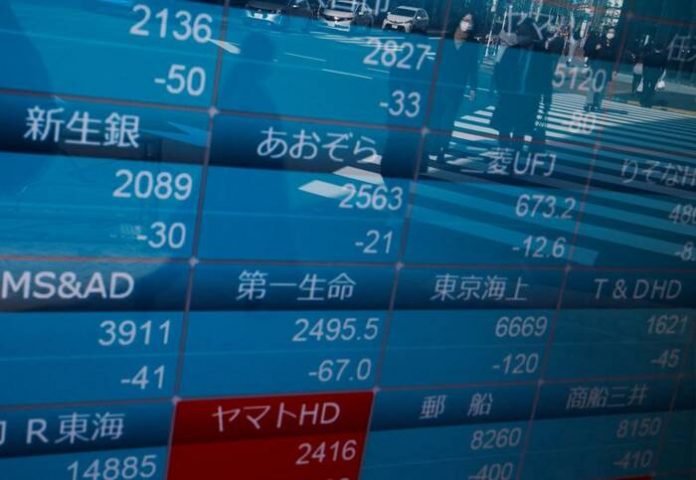SINGAPORE (Reuters) -Asian shares reversed early gains, with investors in Chinese stocks unsettled by U.S. moves against 33 Chinese entities, with markets otherwise waiting for U.S inflation data that could influence how fast the Federal Reserve raises interest rates
Traders are alert for rate hikes in both the euro zone and the United States after the European Central Bank last week was considered to have adopted a more hawkish tone.
Euro Stoxx 50 futures eased and FTSE futures edged up 0.1%, indicating a mixed start for European equities.
MSCI’s broadest index of Asia-Pacific shares outside Japan shed 0.3% to 612.3 after rising to 617.7, the highest since January 25. The benchmark is up nearly 3% from a more than one-year low of 595.99 struck on Jan 27.
“Much of investors’ concern is focused on the five Fed increases that markets are pricing in for 2022, and if they won’t be sufficient to contain inflation,” Seema Shah, chief strategist at Principal Global Investors, said in a note.
“Yet, the Fed’s urgency to tighten should soon ease as the most acute economic price pressures start fading. Furthermore, while U.S. growth has likely peaked, a recession isn’t in the cards,” she said.
Japan’s Nikkei rose 0.3%, Korean stocks went up 0.5% and Taiwan gained 0.7%.
Chinese stocks were the standout losers, with the CSI300 index down 1.8% as investors fretted over the prospect of the U.S. government adding a further 33 Chinese entities to its export control list.
Hong Kong’s Hang Seng index shed 1.5%, weighed down by losses in tech shares. [.HK]
U.S. consumer price figures for January are due on Thursday and could show core inflation accelerating to the fastest pace since 1982 at 5.9%.
“Central banks are really front and center in everyone’s narrative. We believe they want to be patient,” analysts at MFS Investment Management said in a report.
“We believe they’re aware of their footprint in the marketplace today, but at minimum we can say in no uncertain terms, that financial conditions will be tightening in 2022 and therefore likely more conducive to errors.”
S&P 500 futures held steady, while Nasdaq futures put on 0.1% in Asian trading.
Major Wall Street stock indexes ended down as markets digested mixed quarterly results. “Corporate profits are the strongest in decades, consumers are backed by excess savings, and gradual supply chain normalization should provide a boost to inventories and production,” Shah of Principal Global Investors said.
The U.S. January payrolls report on Friday showed annual growth in average hourly earnings climbed to 5.7%, from 4.9%, while payrolls for prior months were revised up by 709,000 to radically change the trend in hiring.
The prospect of hikes has bond markets reeling, and in Asia both Treasuries and Japanese government bond yields rose, with the yield on benchmark 10-year Treasuries up about 3 basis points to 1.9500%.
German two-year bonds had their worst week since the spring of 2008 last week and selling had extended on Monday, with Italian and Greek bond prices hit hardest.
In foreign exchange markets, the euro inched down 0.16% to $1.1415, having shot up 2.7% last week in its best performance since early 2020 on the tightening expectations.
The dollar crept 0.2% higher on the yen to 115.45.
Oil prices eased on Tuesday ahead of talks between the United States and Iran officials, which could lead to the removal of U.S. sanctions on Iranian oil sales.
Brent crude was last down 0.2% to $91.1 a barrel after hitting a seven-year high of $94 on Monday. [O/R] Spot gold prices were steady at a 1-week high at $1,821 per ounce.




